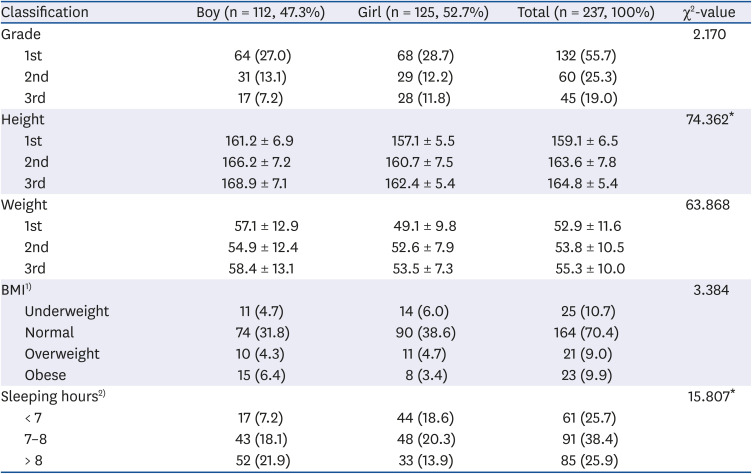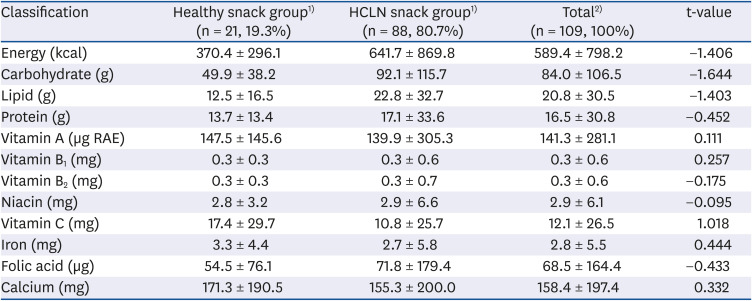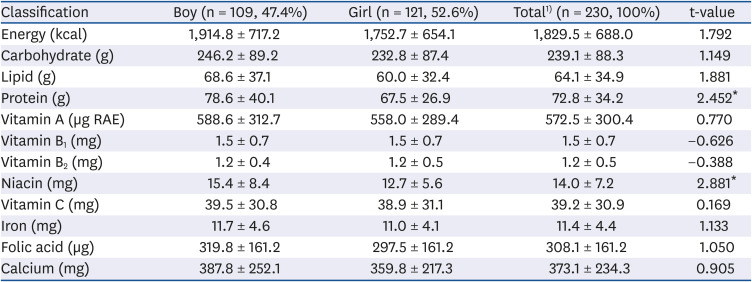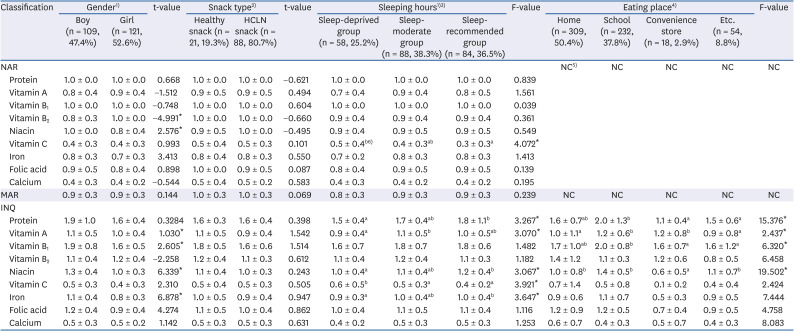1. Heo GJ, Nam SY, Lee SK, Chung SJ, Yoon JH. The relationship between high energy low nutrient food consumption and obesity among Korean children and adolescent. Korean J Community Nutr. 2012; 17:226–242.
2. Kim HB, Park YW. Correlation between sleep quality and snack intake in third year middle and high school students in Gwangju area. J Korean Soc Food Sci Nutr. 2013; 42:212–222.
3. Joo S, Ju S, Chang H. Comparison of fast food consumption and dietary guideline practices for children and adolescents by clustering of fast food outlets around schools in the Gyeonggi area of Korea. Asia Pac J Clin Nutr. 2015; 24:299–307. PMID:
26078247.
4. Alkerwi A, Crichton GE, Hébert JR. Consumption of ready-made meals and increased risk of obesity: findings from the Observation of Cardiovascular Risk Factors in Luxembourg (ORISCAV-LUX) study. Br J Nutr. 2015; 113:270–277. PMID:
25488071.

5. Alexy U, Sichert-Hellert W, Rode T, Kersting M. Convenience food in the diet of children and adolescents: consumption and composition. Br J Nutr. 2008; 99:345–351. PMID:
17692151.

6. Bae YJ, Yeon JY. Evaluation of nutrient intake and diet quality according to beverage consumption status of elementary school, middle school, and high school students: from the Korean National Health and Nutrition Examination Surveys, 2007-2008. Korean J Nutr. 2013; 46:34–49.

7. Kim SH, Park SH, Chang KJ. Consumption behaviors of sugar-sweetened beverages and blood lipid profiles according to food-related lifestyles of adults in Incheon. J Nutr Health. 2017; 50:325–335.

8. Henriksson P, Cuenca-García M, Labayen I, Esteban-Cornejo I, Henriksson H, Kersting M, Vanhelst J, Widhalm K, Gottrand F, Moreno LA, Ortega FB. Diet quality and attention capacity in European adolescents: the Healthy Lifestyle in Europe by Nutrition in Adolescence (HELENA) study. Br J Nutr. 2017; 117:1587–1595. PMID:
28662732.

9. Jo JI, Kim HK. Food habits and eating snack behaviors of middle school students in Ulsan area. Korean J Nutr. 2008; 41:797–808.
10. Kim Y, Chang H. Correlation between attention deficit hyperactivity disorder and sugar consumption, quality of diet, and dietary behavior in school children. Nutr Res Pract. 2011; 5:236–245. PMID:
21779528.

11. Lee JH, Woo JH, Chae HJ, Lee EH, Chyun JH. Study of dietary behaviors and snack intake patterns by weight of middle school students in Incheon. Korean J Food Culture. 2010; 25:366–377.
12. Kim SY, Ryu SA. The relationship between beverage consumption, nutrient intake and body mass index in elementary school students in Gyeongnam area. Korean J Nutr. 2008; 41:530–538.
13. Kim KH. Factors influencing high school students' sleep duration: analyzing the 5th Wave Data from Korean children & youth panel study. J Adolesc Welf. 2017; 19:57–84.
14. World Health Organization. Guideline: Sugars Intake for Adults and Children. Geneva: WHO;2015.
15. Kim HJ, Oh HM, Cho YJ, Yoon JS. Relationships between nutrient intake status and sugar-containing food intake of elementary school students in Daegu-Kyungbook area. Korean J Community Nutr. 2010; 15:573–581.
16. Bel S, Michels N, De Vriendt T, Patterson E, Cuenca-García M, Diethelm K, Gutin B, Grammatikaki E, Manios Y, Leclercq C, Ortega FB, Moreno LA, Gottrand F, Gonzalez-Gross M, Widhalm K, Kafatos A, Garaulet M, Molnar D, Kaufman JM, Gilbert CC, Hallström L, Sjöström M, Marcos A, De Henauw S, Huybrechts I. HELENA Study Group. Association between self-reported sleep duration and dietary quality in European adolescents. Br J Nutr. 2013; 110:949–959. PMID:
23506795.

17. Hirshkowitz M, Whiton K, Albert SM, Alessi C, Bruni O, DonCarlos L, Hazen N, Herman J, Katz ES, Kheirandish-Gozal L, Neubauer DN, O'Donnell AE, Ohayon M, Peever J, Rawding R, Sachdeva RC, Setters B, Vitiello MV, Ware JC, Adams Hillard PJ. National Sleep Foundation's sleep time duration recommendations: methodology and results summary. Sleep Health. 2015; 1:40–43. PMID:
29073412.

18. Kim KG, Youm YS. Sleep duration and suicidal impulse of Korean adolescents: weekday/weekend sleep duration effects and gender difference. J Korea Contents Assoc. 2015; 15:314–325.

19. Kim SH, Kim YS, Jang YH, Park J, Ryu SY. The association between sleep duration and quality and body mass index in Korean adolescents. J Korean Soc Sch Health. 2012; 25:51–58.
20. Kruger AK, Reither EN, Peppard PE, Krueger PM, Hale L. Do sleep-deprived adolescents make less-healthy food choices? Br J Nutr. 2014; 111:1898–1904. PMID:
24524288.

21. Aranceta Bartrina J, Pérez-Rodrigo C. Resources for a healthy diet: school meals. Br J Nutr. 2006; 96(Suppl 1):S78–81. PMID:
16923256.

22. Kwak TK, Lyu ES, Lee HS, Lyu K, Choi SK, Hong WS, Jang MR, Moon HK, Chang HJ, Choi EH, Lee KE, Choi JH, Lee NY. Institutional Foodservice Operations. 5th ed. Seoul: Shinkwang Pub.;2019.
23. Robinson E, Higgs S. Food choices in the presence of ‘healthy’ and ‘unhealthy’ eating partners. Br J Nutr. 2013; 109:765–771. PMID:
22647276.

24. Bleich SN, Wolfson JA. Trends in SSBs and snack consumption among children by age, body weight, and race/ethnicity. Obesity (Silver Spring). 2015; 23:1039–1046. PMID:
25919923.

25. Korea Centers for Disease Control and Prevention. Korea Health Statistics 2017: Korea National Health and Nutrition Examination Survey (KNANES VII-2). Osong: Korea Centers for Disease Control and Prevention;2018.
27. The Korean Nutrition Society. Ministry of Health and Welfare (KR). Dietary Reference Intakes for Koreans. Seoul: The Korean Nutrition Society;2015.
28. Bae YJ. Evaluation of nutrient intake and food variety by age in Korean adolescents: based on 2010-2012 Korean National Health and Nutrition Examination Survey. J Nutr Health. 2015; 48:236–247.

29. Korea Centers for Disease Control and Prevention. The 2017 Adolescent Health Behaviors Online Survey Statistics. Osong: Korea Centers for Disease Control and Prevention;2017.
30. Dubuisson C, Lioret S, Touvier M, Dufour A, Calamassi-Tran G, Volatier JL, Lafay L. Trends in food and nutritional intakes of French adults from 1999 to 2007: results from the INCA surveys. Br J Nutr. 2010; 103:1035–1048. PMID:
20028601.

31. Nishi SK, Jessri M, L'Abbé M. Assessing the dietary habits of Canadians by eating location and occasion: findings from the Canadian community health survey, cycle 2.2. Nutrients. 2018; 10:682–693.

32. National Institute of Food and Drug Safety Evaluation (KR). A Study on the Dietary Pattern and Intake of Potentially Hazardous Nutrients among Korea Adults. Osong: Ministry of Food and Drug Safety (KR);2018.
33. Choi JM. A study on snack intake status according to degree of middle school students' sleeping in Gwangju region [master's thesis]. Naju: Dongshin University;2008.
34. Park IJ, Park YW. Survey on intake of snacks and self-purchased snacks due to lack of sleep in high school students in Gwangju. Korean J Food Cult. 2009; 24:256–266.
35. Westerlund L, Ray C, Roos E. Associations between sleeping habits and food consumption patterns among 10-11-year-old children in Finland. Br J Nutr. 2009; 102:1531–1537. PMID:
19664303.

36. Kee YJ, Kim Y, Shin W. Mental health and nutritional intake according to sleep duration in adolescents - Based on the 2007-2016 Korea National Health and Nutrition Examination Survey. J Korean Home Econ Educ Assoc. 2018; 30:1–14.









 PDF
PDF Citation
Citation Print
Print






 XML Download
XML Download